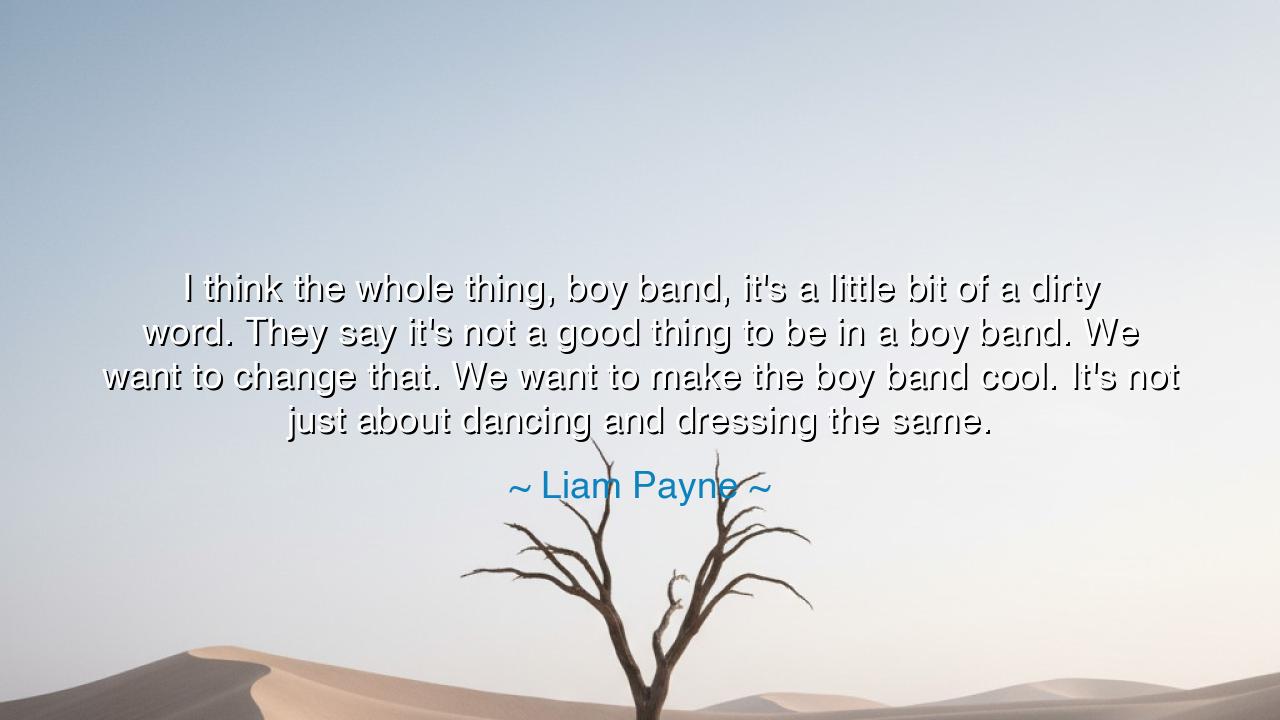
I think the whole thing, boy band, it's a little bit of a dirty
I think the whole thing, boy band, it's a little bit of a dirty word. They say it's not a good thing to be in a boy band. We want to change that. We want to make the boy band cool. It's not just about dancing and dressing the same.






"I think the whole thing, boy band, it's a little bit of a dirty word. They say it's not a good thing to be in a boy band. We want to change that. We want to make the boy band cool. It's not just about dancing and dressing the same." With these words, Liam Payne offers a powerful reflection on identity, perception, and the challenge of redefining cultural norms. The concept of the boy band, traditionally seen as a shallow, manufactured entity focused solely on image and synchronized performance, is one that has often been dismissed as superficial. Yet, Payne and his bandmates sought to shift this narrative, to make the boy band synonymous not just with coordinated routines but with authenticity, musical integrity, and a deeper, more personal connection with their fans. In this sense, they sought to reshape the meaning of the term, elevating it beyond mere image into a symbol of artistic expression.
In the ancient world, the idea of perception and identity was often a central theme. In Greek philosophy, the notion of self-realization was paramount. Figures like Socrates and Plato believed that individuals must transcend the superficial roles society assigns to them and seek a deeper understanding of their true essence. Plato's Allegory of the Cave speaks to this very idea: humans are trapped in a world of illusions, and it is only by turning toward the light of truth and self-awareness that they can break free from the limitations imposed by society. Just as Socrates questioned the norms of his time and sought to awaken others to a higher understanding of virtue and truth, Liam Payne sought to challenge the limited view of the boy band and reveal a more meaningful reality beneath the surface.
This desire to redefine a cultural label resonates deeply with the stories of those who were misunderstood in their time but later celebrated for their true contributions. Vincent van Gogh is a striking example. During his lifetime, he struggled to find recognition, and his art was often dismissed as crude and chaotic. However, the world later came to recognize the depth of emotion and vision in his work. Similarly, the boy band—at least as it had been traditionally perceived—was often dismissed as shallow or artificial. But Payne and his bandmates sought to transform that label, to show that their collective efforts could embody more than just image and performance. By infusing their music with meaning, by rejecting superficiality and embracing authenticity, they aimed to create something lasting and real—something that transcended the industry’s typical expectations.
What Payne speaks to is the fundamental human desire to be understood for more than just outward appearance or the roles others impose upon us. The boy band, traditionally seen as the epitome of manufactured pop culture, had become a symbol of a certain kind of youthful, idealized energy. Yet, like the philosophers of old, who questioned the external illusions of society, Liam Payne and his fellow bandmates wanted to expose a deeper, more complex narrative. They wanted to show that they were more than just their coordinated outfits and synchronized dance moves—that there was authenticity and substance in their artistry, something that could connect with people on a deeper level than what the mainstream expected of them.
This shift in perception is also reflected in the historical example of the Renaissance—an era that witnessed a profound redefinition of art and culture. Leonardo da Vinci, Michelangelo, and Raphael, among others, broke free from the rigid traditions of medieval art to create works that expressed humanity, emotion, and intellect in new ways. They didn’t just follow established norms; they redefined what art could be. Just as these artists sought to redefine beauty and expression, Payne and his band sought to redefine what it meant to be a boy band—to make it something more than a passing trend and transform it into a legitimate form of musical expression that resonated with depth and authenticity.
The lesson here is that labels and expectations imposed by society are often superficial and limiting. Whether you are part of a musical group, an artist, or an individual trying to navigate the complexities of life, it is crucial to define yourself by your own terms, not by the roles others try to assign to you. Payne's call to change the perception of the boy band is a reminder that no matter how others may perceive us, we have the power to transform those perceptions and redefine ourselves. The challenge is not to accept labels or definitions, but to break free from them and create something new, something that reflects our true vision and purpose.
In practical terms, we must be willing to push boundaries and challenge expectations. Whether in art, business, or personal identity, we are all constantly faced with societal labels—some that limit our growth, others that confine us to a narrow role. The message here is clear: don’t let others dictate your identity or your potential. Just as Liam Payne and his bandmates sought to transform the image of the boy band, we too can reshape how we are perceived by embracing authenticity and pushing beyond superficiality. The world may expect us to fit a mold, but true greatness lies in redefining the very molds others try to place upon us.






AAdministratorAdministrator
Welcome, honored guests. Please leave a comment, we will respond soon